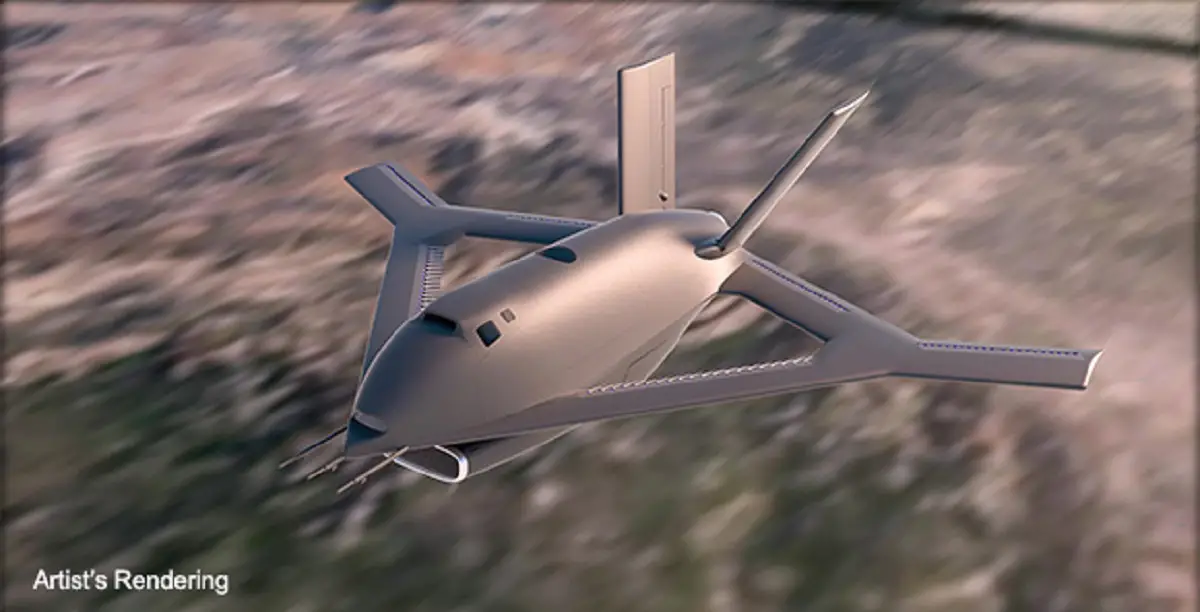DARPA has selected Aurora Flight Sciences to build a full-scale X-plane to demonstrate the viability of using active flow control (AFC) actuators for primary flight control. The award is Phase 3 of the Control of Revolutionary Aircraft with Novel Effectors (CRANE) program. In December 1903, the Wright brothers flew the world’s first fully controllable aircraft, which used wing warping to successfully achieve flight. Virtually every aircraft since then has used a system of movable, external control surfaces for flight control.The X-65 breaks this century-old design paradigm for flight control by using jets of air from a pressurized source to shape the flow of air over the aircraft surface, with AFC effectors on several surfaces to control the plane’s roll, pitch, and yaw. Eliminating external moving parts is expected to reduce weight and complexity and to improve performance.
“The X-65 is a technology demonstrator, and it’s distinctive, diamond-like wing shape is designed to help us maximize what we can learn about AFC in full-scale, real-world tests. The X-65 conventional surfaces are like training wheels to help us understand how AFC can be used in place of traditional flaps and rudders. We’ll have sensors in place to monitor how the AFC effectors’ performance compares with traditional control mechanisms, and these data will help us better understand how AFC could revolutionize both military and commercial craft in the future. We’re building the X-65 as a modular platform – wing sections and the AFC effectors can easily be swapped out – to allow it to live on as a test asset for DARPA and other agencies long after CRANE concludes,” said Dr. Richard Wlezien, DARPA’s program manager for CRANE.
The X-65 will be built with two sets of control actuators – traditional flaps and rudders as well as AFC effectors embedded across all the lifting surfaces. This will both minimize risk and maximize the program’s insight into control effectiveness. The plane’s performance with traditional control surfaces will serve as a baseline; successive tests will selectively lock down moving surfaces, using AFC effectors instead. The 7,000+ pound, unmanned X-65 will have a 30-foot wingspan and be capable of speeds up to Mach 0.7. Its weight, size, and speed – similar to a military trainer aircraft – make the flight-test results immediately relevant to real world aircraft design. Aurora Flight Sciences has already started fabricating the X-plane; the X-65 is scheduled to be rolled out in early 2025 with the first flight planned for summer of the same year.
Aurora Flight Sciences is an American aviation and aeronautics research subsidiary of Boeing which primarily specializes in the design and construction of special-purpose Unmanned aerial vehicles. The company has four facilities that each have their own focus. Corporate Headquarters and Engineering are in Manassas, Virginia. A manufacturing center was opened in Fairmont, West Virginia, in 1994, being moved to Bridgeport, West Virginia, in 2000. Another manufacturing facility was opened in Starkville, Mississippi, in 2005 before being moved to the nearby Golden Triangle Regional Airport in Columbus, Mississippi, in 2007. A research and development center was opened in Cambridge, Massachusetts in 2005 where Aurora now develops a line of micro air vehicles.















